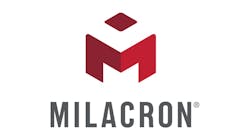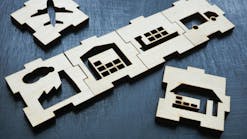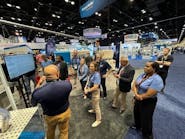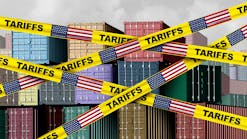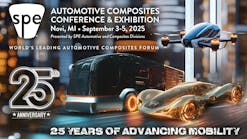Early exposure led Tad McGwire on path to chair PLASTICS
Tad McGwire was an undergraduate student at the University of Chicago when he attended his first NPE trade show in 1979. This year he became chairman of the Plastics Industry Association (PLASTICS), which organizes the show every three years.
In between those events, McGwire graduated from the University of Chicago with a degree in economics and earned an MBA in 1986. He also started his own company, Phoenix Lighting Products, a supplier of automotive interior lighting components.
The family business, Cheshire, Conn.-based Industrial Heater Corp., was headed by McGwire’s father, Tom McGwire Sr. He ran the business from 1970 to 1991 and helped to create many standards related to heater design.
“I was in Chicago, and my father decided that he wanted to retire, and he provided me the opportunity to buy him out, which I did,” McGwire said. “I moved back to Connecticut in order to take over Industrial Heater. I was 30 at the time and full of ideas and enthusiasm, and I’m still here 30 years later.”
McGwire discussed his career path, the chairman’s role at PLASTICS and his goals for the trade organization with Plastics Machinery & Manufacturing Senior Reporter Bruce Geiselman.
What was your first job out of college?
McGwire: I worked for New York Life Insurance right out of college.
Industrial Heater Corp. is a family business. I’m the third generation. We’re 100 years old as of last year. So, coming out of college, I wanted to work for other companies before coming into the business.
How were you first exposed to the plastics industry?
McGwire: I was exposed to the plastics industry at the 1979 NPE [National Plastics Exposition] because I was in Chicago for school, and my father asked me to come to the NPE and help him set up and take down. That was my first real exposure in the plastics industry. Then again in 1982, I was at the show, but I was also at the inaugural meeting of what was then being formed as the Components Division of SPI [today known as PLASTICS] at the time.
How did you start assuming leadership roles within PLASTICS?
McGwire: I bought Industrial Heater Corp. from the family in 1991. Fairly soon thereafter, I got involved with PLASTICS.
It was a great way for me to meet the industry. I developed a couple of mentors from those meetings. It was my opportunity to meet with other leaders in the industry and be able to ask questions about everything from what they were doing about their health insurance to how the industry was moving forward.
What are the various positions that you have held with PLASTICS? How did you progress through the ranks?
McGwire: The organization has changed quite a bit over time, as you know. When I first got involved, I was involved with the Components Division. The Components Division was all the people that manufactured components for the equipment, and we had our own division for a few years. I eventually became the treasurer and the chairman of components.
Then components merged into the Machinery Division, and I became the treasurer and then the chair of machinery. Machinery was then collapsed into the Equipment Council, and I was the first chair of the Equipment Council when that was created under Bill Carteaux [late president and CEO of PLASTICS]. And when I became the chair of the Equipment Council, I was added to the board of directors, and a couple of years after I joined the board, I think it was 2012, I was nominated to become an officer. I’ve been around long enough that I worked my way through the various positions in the officer corps and became the chairman.
What are the duties of the PLASTICS chairman?
McGwire: Outside of running our board meetings or chairing our board meetings, the officers and the board serve in an oversight role, and I lead that oversight role.
We also provide some strategic advice on the organization. It’s a complex organization. We have a lot of interests that we are trying to serve, and hopefully, positively promoting the industry from many fronts.
What do you hope to accomplish as PLASTICS chairman?
McGwire: Well, my first goal is to make sure we get our finances solidified.
Given the cancellation of NPE2021, I want to make sure that we have a very solid financial foundation going forward with the appropriate guardrails to make sure that we’re a vibrant, successful organization well into the future. That’s my first goal.
My second goal is that we have to do a better job of communicating with our members and with the public. We have to define better what it means to be the voice of the industry so that we’re more disciplined in our messaging. We’ve had conversations with members who would like to see us be more proactive about the way we get our message out. So, one of my goals is to, again, make sure that we are on a good path to develop the communications, protocols and messaging that we need to be successful.
Lastly, we’re an organization that is built up of three councils, all critical to the success of PLASTICS. You have the Equipment Council, the Materials Council and the Processors Council, and sometimes those councils operate in silos. We don’t cross-pollinate between the three councils enough. I think we need to be more collaborative amongst all the members of various disciplines. The more we speak with one voice, to everyone’s benefit, the more powerful that voice will be.
What challenges is the association facing? Particularly regarding the pandemic and the cancellation of last year’s NPE.
McGwire: The organization is on very solid financial footing, which I’m grateful for.
The challenges, like all organizations right now, we’re struggling with people — getting people and retaining good people. Washington, D.C., as a living-working environment is different from just about anybody else in the country, and that’s been a challenge. We are in the process of evaluating, reassessing, where we are with employee benefits and salary structures and typical reassessments that all employers are going through now in terms of being able to attract and keep good people. We have some great people on staff, and I’m excited about the organization, but we’ve also lost a couple of good people recently, and we just want to make sure we’re competitive. [Editor's note: This interview was conducted prior to the departure of president and CEO Tony Radoszewski.]
The people who have left, have left for better positions with higher compensation. So, we wish them the best and congratulate them on their new positions, but we want to make sure we’re competitive. We’re not taking it for granted that we’re still doing well within the marketplace. We think we are, and, again, the people that have left, have left for good reason in terms of their personal benefits. We just want to make sure we’re in the right spot.
COVID has been a challenge. The challenge due to COVID now is getting people back into the office. That’s a national issue — getting people back to work. I think we’re stronger as an organization when we’re together and can collaborate, particularly given the diversity of the organization. So, finding a way to get people back into the office positively is a challenge.
NPE is a major source of revenue. How have you been able to overcome that loss of funding?
McGwire: NPE is a major financial contributor to PLASTICS and our efforts. We have, over the last 12 years, conscientiously tried to build up our savings. We had a rainy-day fund, which we used to help get through this past year.
We have a very loyal and significant membership base, and the membership dues kept coming in during that time period, which also helped, and we had some cost savings because during COVID, there certainly wasn’t the travel we normally have, etc., and that benefited us. We were able to stay very financially stable.
Going forward, we did have pandemic cancellation insurance. We have resolved that claim with the insurance company, and, again, it’s going to allow us to go forward and be strong and live to fight another day.
Some of the exhibitors were concerned that they might not get refunds. Has that all been ironed out?
McGwire: It has all been ironed out. In fact, we had an info web broadcast [March 1] with Glenn Anderson, who leads membership for PLASTICS, and Steve London, of Bekum America, who is the NPE chair for ’24, and we will be crediting all monies paid on booth space up to the first 50 percent toward NPE2024. So, anybody who paid more than the original 50 percent deposit had those monies refunded to them. Anybody who paid up to that initial 50 percent, those monies will be credited to 2024.
We’re getting very positive feedback from our exhibitors, as well, regarding that announcement, and we are grateful to our NPE exhibitors who showed a great deal of patience and understanding with us as we worked through this. I think that they’re satisfied; they’re happy with our ability to now credit this toward ’24.
Is anything special planned for NPE2024?
McGwire: Well, I think they’re all special. I was the chair of NPE ’21, and I’ve been involved in the NPE committees since 2006. We have a lot of things planned to keep the brand alive and in front of people over the next three years. I think it’ll be an exciting show, I think people will be thrilled to get back together. And as always, it’s a great place to come and see new ideas, new technologies and get a real test of what’s going on in the industry.
Recently there has been an environmental backlash against plastics. What impact is that having on the association and its members?
McGwire: It’s certainly having an impact on the members. They’re certainly concerned about it, as well they should be.
We do have a solid waste problem in this country and in the world, and we want to be part of that solution to the issue. As an industry, I don’t think we need to apologize for the products that we manufacture. We manufacture products that save people’s lives, preserve food, and lower the carbon footprint of mankind. Again, we don’t have anything to apologize for. But the truth of it is, a lot of our products end up either in landfills or in the environment, and we need to be part of the solution to make sure that the end of life for our products is handled appropriately and environmentally.
How can the association and its members help ensure that plastic waste is properly handled?
McGwire: We need to be a part of helping to develop or promote some of the advanced recycling and alternative recycling methods that are available. I think that one of our strengths is advocacy. We need to use our contacts in Washington and our advocacy efforts to help build or promote funding for better municipal facilities that can recycle our materials, and just being a voice for sustainability, and, again, call to action. We’ve got to get this material collected and in the right hands and in the right waste streams so that it’s handled appropriately.
Does PLASTICS have plans to counter the anti-plastics movement?
McGwire: We do; it does become a function of resources. We don’t have the resources to do a national campaign talking about plastics and the benefits of plastics. We do have the resources to address a lot of the attacks on a one-on-one basis through the internet, through social media, which we will be doing. Again, this is going back to one of my goals about communications. I think we need to be better at it, addressing those concerns and the negative press that we get. And we will do that.
How difficult is it to balance your responsibilities as chairman of PLASTICS and as president and CEO of Industrial Heater?
McGwire: It’s been a challenging couple of years to be involved with PLASTICS, given the untimely passing of [former president and CEO] Bill Carteaux, the cancellation of NPE and some of the other challenges we faced, but I am fortunate in that my oldest son [Tom] — he’s the fourth generation — is now involved in the business. Between him and a very long-time employee, Helen Lespier, who’s our president, I’m able to spend probably more time than a typical member is on PLASTICS business. It’s been a challenge, but it’s working out and I enjoy it. I feel very fortunate to have been able to get involved with the PLASTICS association. Over the years, I’ve met some great people. I love our industry. I really enjoy the camaraderie from being part of this industry.
And I’ve made some lifelong friends as a result of my engagement. So, it’s a passion of mine to fight for our industry and to be engaged with the people in our industry, because I think we have some really outstanding members and contributors to not only the plastics industry, but to our country and to the communities they serve. It’s really a diverse and interesting group of people.
Who was your mentor?
McGwire: My father. I think that he did a great job with Industrial Heater Corp. in the years that he ran it. He was probably one of the most ethical people I’ve ever worked with, and very smart, very practical, down to earth.
How would you like to be remembered?
McGwire: I would like to be remembered as somebody who contributed — who added something to the various components of my life that I’ve touched. I’ve coached. I’ve participated, obviously, in plastics. I’ve been engaged in my community locally and in my community from a business standpoint. I would just like it to be remembered that I contributed back to those communities.
Just the facts
Who is he: Tad McGwire
Age: 61
Titles: Chairman of the Plastics Industry Association (PLASTICS) and CEO and owner of Industrial Heater Corp.
Location: PLASTICS is in Washington, D.C.; Industrial Heater is in Cheshire, Conn.
Term as chairman of PLASTICS: Jan. 1, 2022-Jan. 1, 2024
Employees at PLASTICS: 45
Members of PLASTICS: 900
Education: University of Chicago – bachelor’s degree in economics; MBA
Bruce Geiselman | Senior Staff Reporter
Senior Staff Reporter Bruce Geiselman covers extrusion, blow molding, additive manufacturing, automation and end markets including automotive and packaging. He also writes features, including In Other Words and Problem Solved, for Plastics Machinery & Manufacturing, Plastics Recycling and The Journal of Blow Molding. He has extensive experience in daily and magazine journalism.

